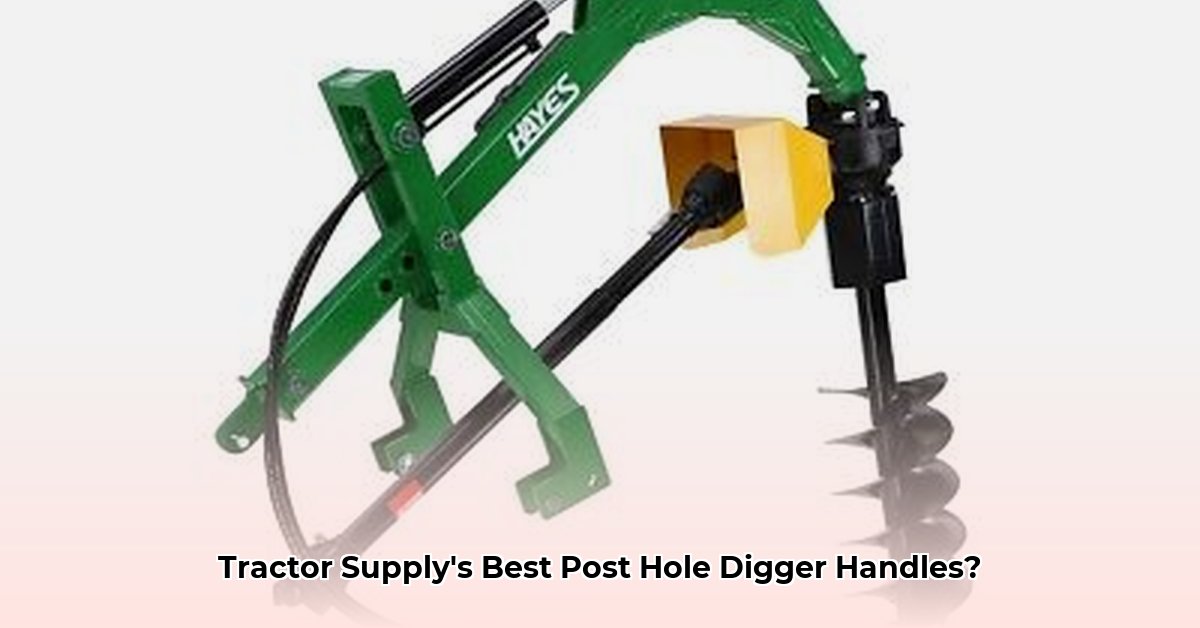
Post Hole Digger Handles at Tractor Supply: Starting Your Search
Finding the right post hole digger handle can seem daunting, but Tractor Supply offers a good selection to begin your search. They typically stock handles sold individually or as part of complete digger sets. Handle lengths and materials vary significantly, impacting ease of use and overall digging efficiency. Common materials include sustainably sourced wood (look for certifications!), durable fiberglass, and robust (but heavier) steel. Naturally, price points vary depending on these factors. Longer handles provide increased leverage but can be less maneuverable in tight spaces, while shorter handles demand more effort but offer superior control. Before you buy, consider which factors are most important for your projects.
Beyond the Handle: Types of Post Hole Diggers & Their Environmental Impact
The handle is just one component. The type of post hole digger itself significantly impacts both efficiency and environmental impact. Let's compare the most common options:
| Digger Type | Advantages | Disadvantages | Environmental Impact |
|---|---|---|---|
| Manual | Low cost, zero emissions, good exercise, simple design | Physically demanding, slow, best suited for small jobs | Relatively low, dependent on the handle's material sourcing and sustainability. |
| Gas-Powered | Faster digging, less physical exertion | Uses fuel, produces emissions, noisy | Higher due to fuel consumption and greenhouse gas emissions; fuel efficiency is critical. |
| Electric | Quiet operation, zero direct emissions, reduced strain | Requires a power source, potentially higher initial cost | Lower than gas-powered, but depends on battery life, disposal, and electricity source. |
Which type is right for you? The answer depends heavily on your needs. For smaller projects or those prioritizing minimizing your carbon footprint, a manual digger might be perfect. Larger projects or those requiring faster completion often benefit from the efficiency of gas or electric models, but the environmental trade-offs must be considered. Consider the scale of your project and your priorities.
Choosing a Sustainable Post Hole Digger: A Practical Guide
Sustainable agriculture practices are increasingly important. Here's how to make environmentally conscious choices when selecting your post hole digger:
Prioritize Sustainable Materials: Look for diggers made from recycled materials or sustainably harvested wood (look for certifications like the Forest Stewardship Council – FSC). Transparency in material sourcing is key.
Invest in Durability: A high-quality, durable digger minimizes the need for frequent replacements, reducing landfill waste and resource consumption. It's often a worthwhile investment in the long run.
Plan for End-of-Life: Inquire about the manufacturer's recycling programs or consider if repair or repurposing is feasible to extend the lifespan of your tool, reducing its environmental impact.
Did you know? A durable post hole digger can last for decades with proper maintenance, significantly lowering your lifetime environmental impact compared to frequent replacements.
Sustainable Digging Techniques: Maximizing Efficiency & Minimizing Impact
Even the most eco-friendly tool requires thoughtful usage. Practice these techniques:
Strategic Planning: Carefully plan your project to minimize the number of holes needed. Less digging means less soil disturbance.
Efficient Digging Methods: Utilize techniques appropriate for your soil type and chosen digger. Proper technique not only saves time and effort but minimizes unnecessary soil disruption.
Diligent Maintenance: Regular cleaning, lubrication, and sharpening extend the life of your digger significantly. A well-maintained tool is more efficient, lasts longer, and requires fewer replacements over its lifetime.
"Proper tool maintenance isn't just about prolonging its lifespan," says Dr. Emily Carter, Agricultural Engineering Professor at Cornell University. "It's about optimizing its performance and reducing the need for future production and disposal, both of which have substantial environmental consequences."
The Broader Picture: Sustainable Agriculture and Equipment Choices
Choosing a sustainable post hole digger is part of a larger commitment to responsible farming. Consider the entire lifecycle of your equipment—from manufacturing to disposal— when making decisions. This holistic approach to sustainability, encompassing energy usage, material sourcing, and end-of-life management, directly impacts your farm’s environmental footprint and promotes responsible resource stewardship.
Key takeaway: Sustainable agriculture is not simply a trend; it is essential for the long-term health of our planet and the viability of farming practices. Choosing sustainable tools, like post hole diggers, is a crucial step towards a more environmentally responsible future.